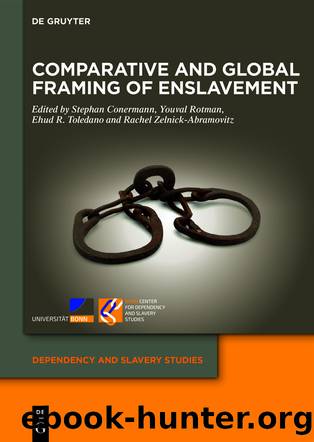Comparative and Global Framing of Enslavement by Stephan Conermann Youval Rotman Ehud R. Toledano Rachel Zelnick-Abramovitz

Author:Stephan Conermann, Youval Rotman, Ehud R. Toledano, Rachel Zelnick-Abramovitz
Language: eng
Format: epub
Publisher: De Gruyter
Published: 2023-10-14T04:46:20.056000+00:00
Notes
1 John W. Verano and Douglas H. Ubelaker, eds., Disease and Demography in the Americas (Washington, DC: Smithsonian Institution Press, 1992): 16.
2 The term glocal, which since the 1990s has entered into various disciplines including sociology and anthropology, was defined by Robertson (Roland Robertson, Globalization: Social Theory and Global Culture [London: Sage, 1994]) as a metatheory relevant to understanding the globalized world of the twentieth and twenty-first centuries.
3 Joachim Blatter, âGlocalization,â in Encyclopedia Britannica, 22.02.2022, https://www.britannica.com/topic/glocalization [accessed 03.04.2023].
4 Norman Yoffee, Myths of the Archaic State: Evolution of the Earliest Cities, States and Civilizations (Cambridge: Cambridge University Press, 2005).
5 Victor Roudometof, Glocalization: A Critical Introduction (London: Routledge, 2016): 16.
6 Philemon Bantimaroudis, Review of Globalization: A Critical Introduction, by Victor Roudometof, International Journal of Communication 11 (2017): 728â30. This characterization has seemed especially necessary since the onset of the twenty-first century, as the influence of the concept of globalization has begun to decline in the context of the finance crisis, the dawn of new social movements, and the advance of right-wing political groups.
7 Roudometof, Glocalization: 10.
8 Julia Winnebeck et al., âOn Asymmetrical Dependency,â Concept Paper 1, Bonn Center for Dependency and Slavery Studies (2021): 2.
9 Quoted in Winnebeck et al., âOn Asymmetrical Dependencyâ: 2.
10 David Eltis and Stanley L. Engerman, âDependence, Servility and Coerced Labor in Time and Space,â in The Cambridge World History of Slavery, vol. 3, AD 1420âAD 1804, ed. David Eltis and Stanley L. Engerman (Cambridge: Cambridge University Press, 2011): 3, quoted in Winnebeck et al., âOn Asymmetrical Dependencyâ: 2.
11 See also Christian G. De Vito, âFive Hypotheses on Dependencyâ (unpublished manuscript, Bonn Center for Dependency and Slavery Studies, University of Bonn, n.d.).
12 Camayoc were producing âspecialistsâ on different levels of society (community and state level) and acllacuna were âchosen womenâ who also performed specialized work, above all the production of chicha or maize âbeerâ and textiles for the Inka ruler in particular settings. The mitayos formed rotating forced labor groups.
13 Roudometof, Glocalization: 27.
14 See Tamar Hodos, ed., The Routledge Handbook of Archaeology and Globalization (London: Routledge, 2017); especially Jennings, âDistinguishing Past Globalizationsâ: 12, and Sillar, âGlobalization without Markets?â: 229â42.
15 Alexander Geurds, âGlobalization Processes as Recognized in the Americas,â in The Routledge Handbook of Archaeology and Globalization, ed. Tamar Hodos (London: Routledge, 2017): 174.
16 Jennings, âDistinguishing Past Globalizationsâ: 12. The term âbalkanization,â used by Jennings and elsewhere by Covey (R. Alan Covey, âIntermediate Elites in the Inka Heartland, A.D. 1000â1500,â in Intermediate Elites in Pre-Columbian States and Empires, ed. Christina M. Elson and R. Alan Covey [Tucson: University of Arizona Press, 2006]: 113) and other authors should not be applied to these contexts. It is a negatively connotated term coined at the end of the nineteenth century. To this day, it is still associated with violence, primitiveness, conservatism, and patriarchies. This discourse became particularly clear during the Yugoslav wars in the 1990s and early 2000s, âwhen a larger context unfoundedly and in a concrete or figurative sense âbloodilyâ breaks up into a thousand piecesâ (see interview with Martina Baleva, âBalkan.
Download
This site does not store any files on its server. We only index and link to content provided by other sites. Please contact the content providers to delete copyright contents if any and email us, we'll remove relevant links or contents immediately.
| Anthropology | Archaeology |
| Philosophy | Politics & Government |
| Social Sciences | Sociology |
| Women's Studies |
Nudge - Improving Decisions about Health, Wealth, and Happiness by Thaler Sunstein(7706)
The Fire Next Time by James Baldwin(5444)
iGen by Jean M. Twenge(5415)
Adulting by Kelly Williams Brown(4574)
The Sports Rules Book by Human Kinetics(4386)
The Hacking of the American Mind by Robert H. Lustig(4383)
The Ethical Slut by Janet W. Hardy(4251)
Captivate by Vanessa Van Edwards(3839)
Mummy Knew by Lisa James(3691)
In a Sunburned Country by Bill Bryson(3542)
The Worm at the Core by Sheldon Solomon(3487)
Ants Among Elephants by Sujatha Gidla(3467)
The 48 laws of power by Robert Greene & Joost Elffers(3291)
Suicide: A Study in Sociology by Emile Durkheim(3022)
The Slow Fix: Solve Problems, Work Smarter, and Live Better In a World Addicted to Speed by Carl Honore(3009)
The Tipping Point by Malcolm Gladwell(2921)
Humans of New York by Brandon Stanton(2873)
Get What's Yours for Medicare: Maximize Your Coverage, Minimize Your Costs by Philip Moeller(2730)
Handbook of Forensic Sociology and Psychology by Stephen J. Morewitz & Mark L. Goldstein(2705)
